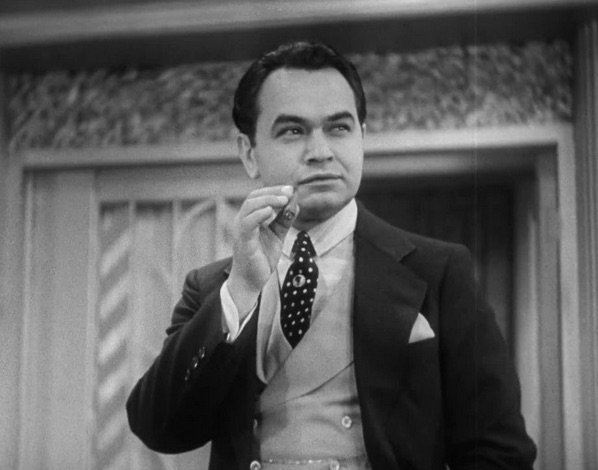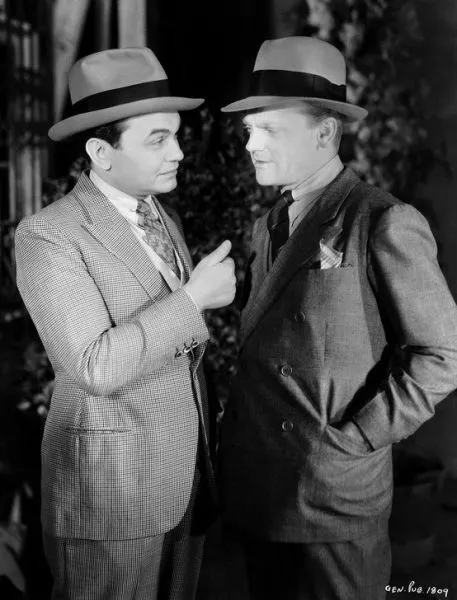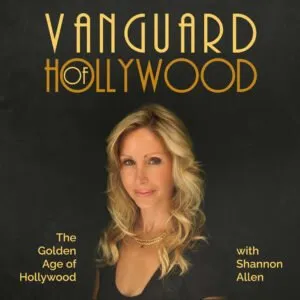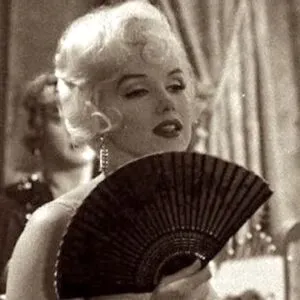Edward G. Robinson is unquestionably one of the greatest stars of Hollywood’s Golden Age. Best known for his numerous gangster films, Robinson was just as convincing playing the moral good guy as he was playing the crime kingpin.
With his unconventional looks and small stature, Edward G. Robinson proved that you didn’t have to look like Clark Gable to be a leading man with an almost kinetic magnetism: despite his diminutive size, on screen Edward G. Robinson was a giant.

Edward G. Robinson: A Man of Culture and Patriotism
Contrary to his tough guy movie image, Robinson was a cultured, intelligent, and sensitive man off camera. Though he was not born in the United States, Eddie’s love for his adopted country was great.
Robinson’s patriotism was nothing short of inspiring: despite his blacklisting by the House Un-American Activities Committee in the late 1940s, Eddie never lost his firm belief in America, or the American Dream his life exemplified.

Though his life and film career were extraordinary, today, Edward G. Robinson is one of the silver screen’s more niche stars.
It’s time for that to change.
Here are a few things about Edward G. Robinson you didn’t know:

Edward G. Robinson Was Born in Romania
Edward G. Robinson was born Emanuel Goldenberg in Bucharest, Romania, on December 12, 1893. He was one of five sons that made up the Goldenberg family.
Some of Eddie’s fondest memories from youth include the early tastes of culture his father Morris gave him in Bucharest. Morris and Manny, as Edward’s family called him, enjoyed venturing out of Bucharest’s Jewish section to catch a silent film, or for a pastry at their favorite bakery. Leaving the Jewish section carried safety risks, but to young Manny, it was worth it: these outings with his father instilled in Manny the adventuresome spirit and zest for life that friends of Edward G. Robinson, movie star, later said were at the core of his being.

Morris and Sarah Goldenberg knew that turn of the century Bucharest offered a limit future for their children: as Jews, their sons would not be permitted an education, and job opportunities would be severely limited. After Manny’s older brother Jack suffered brain damage at the hands of an anti-Semitic mob—injuries that never completely healed, and eventually led to his early death—the Goldenberg family made the transatlantic journey to America.
Manny was nine years old when the Goldenbergs arrived in New York City.

He Spoke 7 Languages (At Least)
Edward G. Robinson was raised in a Romanian-Jewish home. As such, Eddie was fluent in Hebrew, Yiddish, Romanian and German. When he arrived in New York City in 1903, Robinson didn’t speak a word of English. But with his natural knack for languages, young Manny soon spoke English without a hint of an accent.
In addition to Hebrew, Yiddish, Romanian, German, and English, Edward G. Robinson also spoke French, Russian, and Italian.
Eddie’s talent for languages eventually helped him earn his big break on Broadway, and proved an invaluable skill for his contributions to World War II.

Edward G. Robinson: A Lifelong Student
As a man who spoke over seven languages, it’s no surprise to learn that young Manny Goldenberg was an exceptional student. Manny loved to read, and spent his time after school at New York City’s Astor Place Library. As a young man, Manny attended the City College of New York (CCNY), where he studied to be an attorney. Acting eventually proved his greater passion, so Manny left CCNY for the American Academy of Dramatic Arts.
Edward G. Robinson’s love of learning was life-long. As Bill Haber, Eddie’s friend and agent said:

“He had an overview and joy of life more than most people I remember. You’d sit with him and he’d do five things at once. I’ve known few people who were as interested in life…Eddie was someone you could care about very quickly.”
Eddie’s love of learning kept him youthful, and undoubtedly contributed to the steady flow of prestigious film work he enjoyed even in his later years.

Edward G. Robinson Started on Broadway
Though Edward G. Robinson is best remembered for his film work, Eddie’s acting career started on Broadway. His big break came in 1915 with Under Fire, a play that made use of Eddie’s linguistic skills through the many characters of different cultures he played in the show.
Stay Updated
The Latest in Stars and Recipes, Sent Directly to Your Inbox!
Eddie enjoyed a successful stage career, and eventually Hollywood came calling in 1928, when Eddie traveled to California to perform his Broadway show The Racket. It was Eddie’s first gangster role on stage, and the studio big wigs were impressed. Suddenly, Robinson had contract offers from just about every studio in Hollywood.

He eventually signed with Warner Bros in 1930. Since Edward G. Robinson was already a Broadway star, he never experienced the indentured servitude to his studio that other stars often complained about. For the length of Eddie’s career at Warner Bros, he always had some degree of script approval, a privilege coveted by other stars.
Robinson’s star power was such that by the time he signed his 1939 contract with Warner Bros, he was guaranteed $85,000 per film, and the male lead in each film he made. Eddie was nearly fifty years old by this stage of his career, far past the age of most actors playing lead roles at the time. It speaks volumes of Eddie’s value and box office prestige that he was able to negotiate such a desirable contract.

Edward G. Robinson Was Proud of His Roots
Even though Edward G. Robinson became a world-renown film star and lived among the elite of Beverly Hills, he never forgot where he came from.
When Emmanuel Goldenberg was told to change his name to something more “Anglican” at the start of his Broadway career, he retained the “G” for “Goldenberg” as his middle initial to signify his Jewish roots. Robinson also remained a lifelong supporter of Israel, even when it was not politically popular.

He Was the Quintessential Gangster
As a young man, Edward G. Robinson explored his passion for acting during his studies at the American Academy of Dramatic Arts. And it wasn’t long before Eddie realized that his unconventional looks would keep him from the standard leading man roles on Broadway.
As Eddie made the rounds of casting offices, he often told agents [aff. link]:
“I’m not so much on face value, but when it comes to stage value, I’ll deliver for you.”
And deliver he did. Edward G. Robinson proved his stage value on Broadway. But Robinson was sorely disappointed with his physical appearance onscreen, so much so that when Eddie began work on what would have been his first substantial film role, the silent Fields of Glory, he asked to be replaced after seeing the daily rushes. (There is no record of the film ever being completed after Robinson dropped out.)

Eddith finally found his niche when he played his first gangster role on Broadway in The Racket. Despite the fact that Eddie was a gentle, cultured man in real life, he could play the perfect hood. As Robinson himself once said about his screen presence:
“Some people have youth, others beauty. I have menace.”
It was this “menacing” quality Eddie projected that led to his breakthrough film role in the gangster classic, Little Caesar (1931). Following the success of Little Caesar, Edward G. Robinson became a household name. The public’s awareness that Robinson was such a nice guy in real life further contributed to his popularity: the juxtaposition of Eddie’s real life graciousness to his kingpin persona intrigued the public, and continues to fascinate his fans today.

He Lived Beyond His Means
Living beyond our means isn’t something we typically condone. But Edward G. Robinson lived by this interesting mentality, which he learned from his father. According to Eddie, Morris Goldenberg admonished all of his sons to:
“Always live beyond your means. It will make you work harder.”
Maybe it’s just me, but that makes sense.

It’s an interesting code to live by, but it worked for Edward G. Robinson, who was always traveling the world, always well-dressed, and always working hard to get the fulfilling movie roles that kept him in the money.

Edward G. Robinson Was Patriotic
After becoming a film star, Edward G. Robinson shared that:
“My mother may have given birth in Romania, but I was born the day I set foot on American soil.”
Eddie was proud to be an American, and his actions underscore the patriotism he felt for his adopted country.
Eddie’s Jewish Romanian roots, coupled with his frequent travels to Europe as an adult, led him to an early awareness of the brewing conflict in Europe that became World War II. As such, Eddie was an early opponent of the Nazi Party, and admonished the US to enter WWII long before the rest of the country agreed.

At forty-eight years old, Edward G. Robinson was too old to enlist by the time the US entered World War II, but Eddie’s contributions to the war effort were great.
In 1942, Eddie donated his entire earnings for the year to the USO, retaining only what he needed to pay for taxes. Eddie also donated the $100,000 he made for his work on the 1942 film Larceny, Inc. to the USO.
Eddie entertained the troops abroad, and was the first film star to visit Normandy after D-Day. Eddie and his gangster impersonations were some of most requested entertainment among the troops.

Eddie also contributed to the war effort with his linguistic skills when the Office of War Information asked him to go to England and read encouraging messages over the radio to the people of occupied countries in Europe. Because Eddie was fluent in so many languages, he was able to reach thousands.
After the war, many who had been part of the German underground contacted Eddie to thank him for the hope his German broadcasts gave them.

He Was Blacklisted
Technically Edward G. Robinson was graylisted during the House Un-American Activities Committee (HUAC) investigations into suspected communist activity in Hollywood.
At its founding in 1938, HUAC was meant to be a “special investigating” committee, with authority to investigate “subversive” behavior and activities among the general American public. But by 1945, HUAC was a standing committee, and in 1947, early fears of a Cold War with the Soviet Union led HUAC to turn its attentions to Hollywood.
The intent of the committee was to remove communists and communist sympathizers from positions of power in Hollywood. Doing so, HUAC believed, would prevent communist ideology from infiltrating film screens, and influencing American audiences.

The result of HUAC’s accusations, investigations, and hearings was the blacklisting of over 300 directors, actors and screenwriters, who, whether actual communists or merely individuals HUAC suspected to be communists, found themselves unable to find work in Hollywood.
Edward G. Robinson was one of those names.

After two HUAC hearings—one in 1950 and another in 1952—Robinson finally convinced the committee that he was not, and never had been, a communist. It was Eddie’s innocent membership and donations to several anti-Nazi organizations that turned out to be communist fronts that put him on HUAC’s radar. Committee chairman Francis E. Walter (D-PA) later admitted that HUAC never had any evidence that Edward G. Robinson was a communist. (Read more about Eddie and HUAC in my article here.)
Robinson’s career and health suffered greatly from the HUAC accusations, but ultimately he was lucky: once the committee cleared his name, Eddie began a very successful second phase of his career as a character actor, paving the way for mature actors and actresses to find choice roles in prestigious films despite the youth culture of Hollywood.

Art Was His Passion
Edward G. Robinson’s love of art is legendary. Over the course of his career, Eddie accrued one of the most impressive art collections in the world. French Impressionism was his favorite, and he gained a reputation for his expertise on the subject.
After Eddie became a Hollywood star with the great success of Little Caesar (1931), he and his wife Gladys frequently travelled Europe to add to their art collection. As Eddie once joked:
“The art owns us.”

Among his collection, Eddie boasted several Pissaros, Monets, four works from Degas’ Dancers, Cezanne’s Black Clock—one of Eddie’s personal favorites, a few Renoirs, and Van Gogh’s Country Road at Seurat.
When he and Gladys divorced in 1956, Robinson had to sell the majority of his collection to pay the high demands of the divorce settlement. The part of his beloved collection Eddie sold went for $3.25 million. (Approximately $29 million today!)

Edward G. Robinson Loved to Travel
After his success in 1931’s Little Caesar, Eddie and his wife Gladys traveled frequently. Europe was their favorite destination, both for adding to Eddie’s art collection, and for the rich history and beauty of the continent.
One of the most difficult consequences of HUAC’s accusations was that Eddie was not allowed to renew his passport when it expired, forcing him to stay stateside.

One of the first things Eddie did when his name was cleared by HUAC in 1952 was meet with the Director of the Passport Office, where, after swearing yet again that he was not, and never had been, a communist party member, Eddie was finally able to renew his passport and travel to his beloved Europe once more.

He Loved Cigars
Much like the classic gangster characters of his career, Edward G. Robinson loved cigars. In fact, at the start of his film career, when Eddie was convinced he didn’t have the looks to make it in the movies, the only reason he agreed to make The Bright Shawl (1923) was because it would be filmed in Cuba, where the best cigars were made.
Eddie reportedly smoked 25 cigars a day. But according to co-stars like Gena Rowlands, he was always very considerate of when and where he smoked:
“I never saw him light a cigar without saying, ‘Do you mind if I smoke?’ Some stars would not be that way.”

He Was Loyal
One of Edward G. Robinson’s most admirable qualities was his loyalty. Eddie’s loyalty is perhaps best exemplified by his faithfulness to his wife Gladys during their marriage, and the support he gave his son Manny throughout his turbulent adulthood.

Once you were Eddie’s friend, you were his friend for life. His friendship with fellow actor Sam Jaffe is case in point. These two acting greats met as students at CCNY, and remained friends throughout the ups and downs of their respective careers. If Jaffe ever had a hard time finding work, Eddie always had a way to help. Jaffe once said about his good friend Eddie that:
“Wanting to help people ran like a red thread through his life.
What attracted me to him as a friend? He was a wonderful actor. You just had to look at him on stage. And he was very moral.”
Edward G. Robinson was the type of loyal friend anyone would be lucky to have.

More Edward G. Robinson
And that wraps up my introduction to Edward G. Robinson.
Read the rest of my Edward G. Robinson series in the articles below:
Little Caesar (1931)
Bullets or Ballots (1936)
Kid Galahad (1937)
Confessions of a Nazi Spy (1939)
Double Indemnity (1944)












22 Responses
A lovely article about Edward G Robinson. In the TV series, ‘Hollywood Greats’ (BBC) presented by Barry Norman, it was mentioned that Eddie spoke 11 languages. I remember being amazed that anyone could achieve that! Back in the 1970s British TV regularly screened classic film including the gangster movies from the 30s and 40s, I loved them all.
Thank you so much for reading Chrissie! Isn’t Eddie an inspiration? 11 languages, wow! That is so incredibly impressive. Oh I completely agree, the gangster movies from the 30s and 40s are some of my all-time favorite films, and most of my favorites among those star Eddie. Such a talent, and such a classy guy.
Excellent read about a fascinating man, thank you.
Thanks for reading Travis!
Great piece…Thanks so much.
Thanks for reading Glenn! Eddie was a great man.
Have always been fascinated by Edward G Robinson and think his life would make a great movie. After all his achievements it’s unfortunate he is also remembered for offering names to the HUAC. An unfortunate blot on an otherwise exemplary career and life!
Thank you for reading David! I agree, Eddie’s life would make a great film. My Double Indemnity (1944) article covers Eddie’s HUAC years in depth. Such a tragic time.
I loved this article! EGR is one of my all time favorites! However, he was not in the 1948 movie “Larceny”. He was in the 1942 movie “Larceny, Inc”. Just a little FYI from a EGR fan!
Hi Marianne, what an oversight, thank you for catching that! 🙃 😆 Thanks so much for reading, and for your kind words!
Thanks so much for this article.
With his son’s passing did he have any living relatives? I would love to get in touch with someone who knew him (or about him, such as a agent).
I am a distant relative, and would love to pass on some old family pictures of him.
Thanks for reading Rita! How neat that you’re related to Eddie. I don’t have any contact info, but Eddie did have a granddaughter, Francesca Robinson Sanchez. She was the apple of his eye. I believe Francesca had a son as well. Hope this helps!
A wonderful article about a man who’s been my favourite actor for years now. There is so much to admire in a man like Eddie.
Thanks for reading JoAnne! I agree, Eddie was a remarkable man and one of the screen’s finest actors.
Amazing that your article was unknown to me until now. As author of The Edward G. Robinson Encyclopedia (McFarland & Co., 2002), I have collected anything and everything on his life and career, and (modestly, I hope) claim to be his Number One fan for over sixty years! He was truly the marvelous art patron, performer, and gentleman that you describe. Thank you, belatedly, for your wonderful words!
Thanks for reading Robert! I am so complimented, your encyclopedia on Eddie is truly the definitive work on his remarkable life.
I am a big fan of the underrated Brother Orchid. a true gem that is unlike any film from that time period. It goes from screwball comedy-to semi drama with consistent comedy- then into some sort of spiritual; mediation on life.
Thanks for reading Rob! Brother Orchid is a great film, what a perfectly worded description. Can’t think of anyone but Eddie who could have made the film work, he’s phenomenal in it.
This is one of the greatest human beings of all time and also somewhat underrated. The way he served the country…and never stopped!
Hi Eric, I completely agree. Eddie was an exceptional actor and an exceptional man. His life and service are an inspiration. Thanks for reading!
Thank so much. He was like my grandfather born Jewish in Bucharest, Romania and was a great actor and greater man! My favorite role as the German born Union officer and Secretary of the Interior Carl Schurz, who fought for the Native Americans rights. And just like .my Dvinsk Latvian born other grandfather who was 5 feet 5 inches tall and ne we are both polymaths and polygots who speak seven languages. Eddie was quite a mensch!
Thanks for commenting Robert! How neat that you, Eddie, and your grandfathers share so many similarities, down to the language skills! I agree, Eddie was a remarkable man. You can feel his integrity off screen in his performances on screen, a rare gift that continues to set Eddie apart from other actors and performers. Thanks for reading Robert!